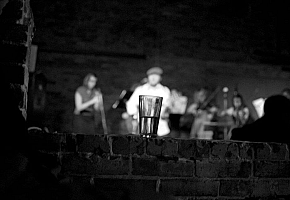Doors at 8pm. Show at 9pm. $5. 21+
The Bones of J.R. Jones
On a recent trip to Southern California, Jonathon Linaberry did the one thing he knows best: he wrote music. That it happened to be during his honeymoon mattered little to the New York-based musician. “I feel like I’m always writing,” the artist who performs as The Bones of J.R. Jones says with a laugh. “I feel ever more confident in the sound I’m trying to create.”
In many ways, Linaberry is a victim of his own creativity. Where some musicians lock themselves away in a studio to create an album or a concrete collection of songs, Linaberry can’t help but write whenever inspiration strikes. The blues singer and multi-instrumentalist, who incorporates elements of old-time folk into the all-encompassing persona of The Bones of J.R. Jones, describes his songwriting as “a continuing evolution.” Nonetheless, he admits he often wishes his ever-wandering creative spirit would settle down. “I would jump at the chance to have the flexibility where I can have six months locked away in a room and focus on one solid cohesive theme for a record,” Linaberry says. “But unfortunately with my schedule I try to cram these songs into the spaces of my life where I can fit them.”
Thankfully, within these delicate cracks of life, Linaberry is able to strike musical gold: The Bones of J.R. Jones’ latest album, Spirit’s Furnace, a crisp nine-track effort that bubbles with barroom dust and hard-won wisdom, finds the musician expanding the scope of his musical vision while stripping away the excess. “I’m a little clearer on the message that I’m trying to put out into the world,” says the singer who has effectively blurred the line between his own life and The Bones J.R. Jones character; he draws evermore from his personal life on his songs, most notably the tender, banjo-plucked “Wedding Song” written day’s before his own nuptials.
“It’s definitely a balance,” Linaberry says of expanding beyond his self-created alter ego. “I try to inhabit this character… whoever it may be. But obviously a huge influence on that is what’s going on at that time in my life. And then I’ll twist it through the spectrum of The Bones of J.R. Jones. It usually gets a lot darker after but they both inform each other.”
While 2014’s Dark Was The Yearling hinted at an artist grappling with his influences, albeit still carving out his own existence, the new Bones of J.R. Jones LP instead “feels a little sharper, a little more defined” to Linaberry. “On this album I’m more confident in my choices and feel better about the performances.”
Linaberry remains a disciple of early 20th-century blues and folk artists like Blind Lemon Jefferson and Lightnin’ Hopkins, both of whom the singer discovered in his teenage years. Still, he readily admits more contemporary influences are beginning to creep into his musical oeuvre. “I like to think I’m casting a wider net,” Linaberry says, citing opening Spirit’s Furnace track “13 Kinds” and “I’m Your Broken Dog” as “major departures” for him, what with their heavy folk influences and electric guitar as opposed to his earlier more traditional blues numbers. “I definitely still listen to the folk and blues stuff, but I really try to make a conscious effort to listen to music outside that box — whether it be bands like Sylvan Esso or more pop-influenced stuff,” he adds. “Sometimes you have to find out what the kids are listening to!”
Part of his current challenge, he explains, is paying homage to his influences while still making his own mark. “I am hyperaware of the history that a lot of the music I play brings with it,” he says. “I’m trying my damnedest not to reinvent the wheel but carve out my own voice. It’s very tough to create something in this day and age with everything being a tap away without having a little history involved in it. But it’s about finding that balance where the music does feel fresh and new but also familiar at the same time.”
What has continued to define The Bones of J.R. Jones is the musician’s hypnotic live show. He operates as a one-man band — playing guitar, drums, and singing in unison, creating the feeling of a raucous blues band with more immediacy. However, as a result of his new album’s size and scope there has emerged a stirring impulse in him to bring other musicians onstage.. “These songs are big enough that if I wanted to have another drummer up there with me it would make sense,” he explains. “I’m trying to evolve the live show and the space it lives in.
”Anytime I think about my live show I try to view it from one of my audience member’s perspective,” he concludes. “I do a lot up there. I cover a lot of ground sonically. I’m trying to give myself room to grow.”
w/ Evan Bartels and Scott Severin





